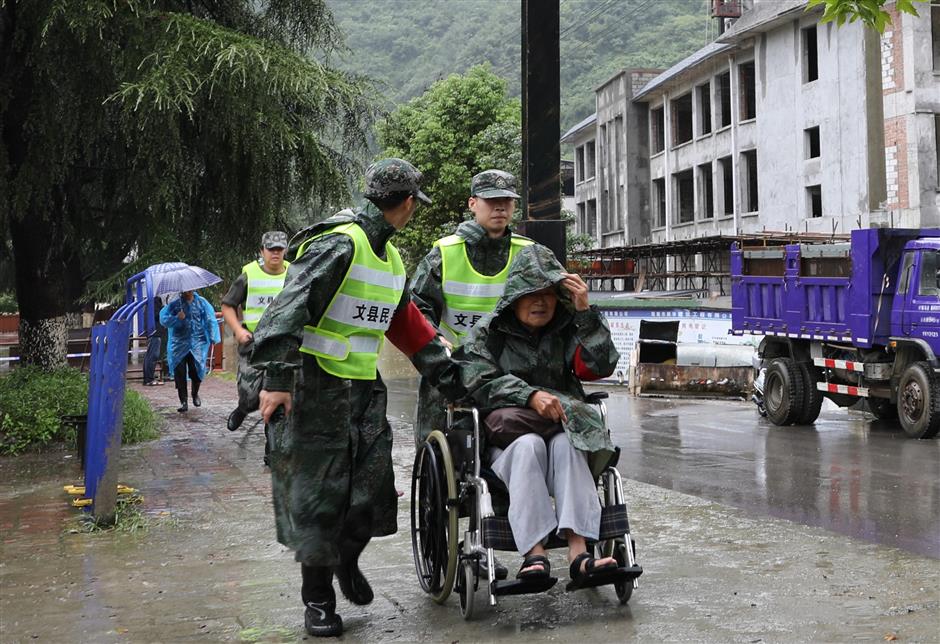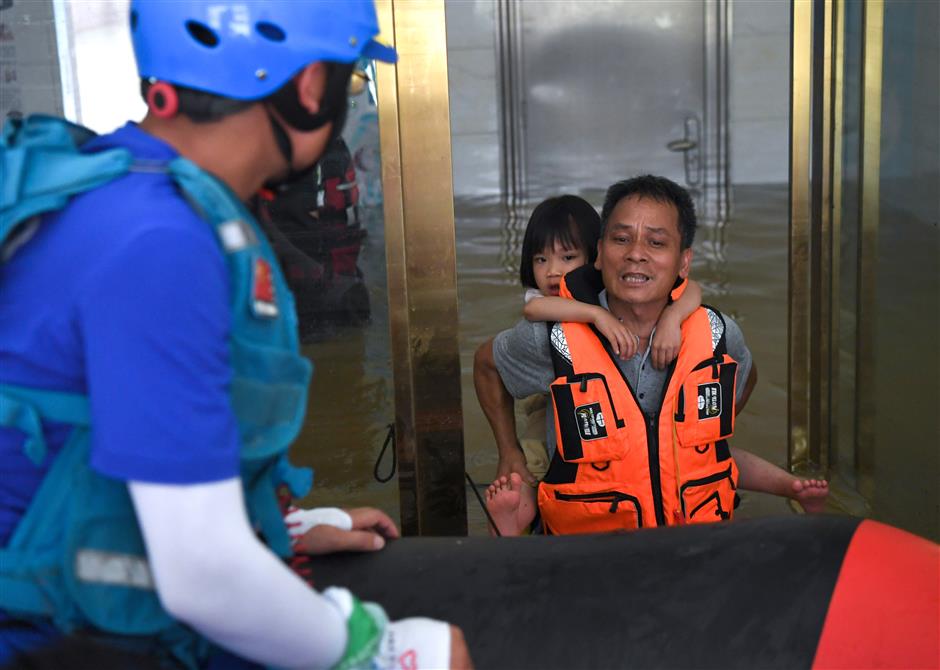Spirited rescuers fight floodwaters and save lives

Rescuers move local residents of a town in Hunan Province to safety during a flood in June 2022.
Faced with the sudden collapse of a levee and the imminent onslaught of 3-meter-high waves, a young army officer swam hard to save his comrades and local residents besieged by floodwater in Hubei Province.
After saving eight people from the whirling flood by putting them safely on resilient trees, he was so exhausted that he failed to survive the attack of another wave.
He died a martyr at 33. His name is Gao Jiancheng.

In this August 1998 file photo, a soldier rescues local residents and relocates them to safety during a flood in Hubei Province.
Gao was one of 300,000 Chinese soldiers summoned to combat the catastrophic floods in 1998, which affected the lives of more than 200 million people along the Yangtze River and certain other rivers. He was affiliated with the air force stationed in Hubei Province, one of the worst-hit areas during the floods caused partly by El Nino, a Spanish term referring to a warming of the ocean surface in the Pacific Ocean.
At 1:35am on July 27, 1998, urgent rescue orders reached his military unit and he immediately applied to join the taskforce heading toward a remote bay area, although he had been suffering from a high fever for several days.
Granted the task, he led a group of soldiers to travel a long distance before reaching the destination. Without rest, he and his soldiers worked non-stop from 7am to 3pm, digging out mud and making sandbags to reinforce local levees in danger of collapse. Such intensive work caused him to faint from exhaustion on a levee several times.
At 8pm on August 1, an alarm sounded around a levee in another bay area. To prevent the collapse of the levee, Gao and his comrades jumped to their feet and departed at 8:03pm. Along the road, they saw floodwater beginning to inundate country roads and local residents starting to retreat from the levee area. As the troops rushed to within 100 meters of the levee in danger, it suddenly collapsed, causing a downpour of floodwater, which formed giant waves as tall as 3 to 4 meters.
A jacket for life
In this dire situation, he took off his life jacket and gave it to someone who could not swim. Then he dived into the floodwater, saving one person after another until a devilish wave hit him in the face and sunk him.
On August 12, Jiang Zemin, then general secretary of the Communist Party of China Central Committee, signed a decree to confer Gao with the honorary title of a "flood-combating hero."
What made him such a hero? In Gao's case, it was his readiness to die for others when death posed a threat to all; it was his willingness to put people's interests before his own.
Like many other heroes fighting the floods, Gao contributed to what is known today as the "flood-fighting spirit" (抗洪精神) that helps shape the Chinese nation.
People's Daily published a commentary in September 1998, summarizing the spirit as comprising but not limited to the following characteristics: selflessness, sacrifice, unity and bravery – all for the good of society at large.

Rescuers help an elderly person escape from danger caused by strong rainfall and mudslides in a town in Gansu Province in August 2020.
First to face the danger
This spirit shone again in the country's historic fight against flooding in 2020. Chen Lu, a 36-year-old firefighter in Lujiang, Anhui Province, sacrificed his life saving people from danger.
That year, on July 22, a levee in Lujiang collapsed and the four nearby villages were all flooded. Xu Xianlai, a 78-year-old villager, said it was the first time he had seen such a big flood. As he ran to a nearby levee and waited anxiously for help, Chen came to his rescue in a rubber boat. The old man was among the first batch of villagers who were moved to safe zones with the help of Chen and his rescue team.
Later, after about 96 hours, Chen and his fellow rescuers ran to various dangerous areas in the vicinity more than 400 times and saved nearly 3,000 local residents.
Despite the strenuous task, Chen was always the first to arrive at the scene. However, an accident eventually occurred. As he and his team sailed near a flooded village, their rubber boat capsized due to a sudden overflow of floodwater.
"Turn back! Turn back!" Chen shouted toward other rescuers who were commandeering rubber boats behind him.
"Hearing Chen's warning, we turned back immediately," recalled Su Qin, head of another rescue team. "More tragedies were avoided because he was the first to face the danger and alerted us without delay."
No sooner had Chen given warning gestures to those who came behind him than the flood engulfed him. About 50 hours later, his body was found in a lower stream 2.3 kilometers away from where he fell.
Before the tragic accident, his knees had already begun to swell up due to long hours working in the water. His knees were so swollen that he found it difficult to take off his trousers. His comrades persuaded him to have a rest, but he refused, saying that many people were waiting to be rescued and he was most familiar with the local conditions.
It was not the first time Chen had insisted upon being the first to meet danger. During the 2008 Wenchuan earthquake in Sichuan Province, he was the first firefighter in his unit to apply to go to the front lines. In the debris around the epicenter, he trudged ahead while carrying rescue equipment weighing more than 30 kilograms. He was stung by poisonous insects and blisters began to appear all over his body. He did not stop for a minute. He was the first to plant a red flag right at the epicenter to give people hope.
In August 2020, President Xi Jinping visited Anhui Province and consoled the family members of Chen and two other people who had given their lives fighting the floods.
"They are our heroes," Xi said.
"Come the moment (of danger), heroes step forward," Xi added. "That shows the great spirit of the Chinese nation."

Soldiers stand in water to form a "human wall" against floods in Hubei Province in August 1998.
Floods hit parts of China again this past summer, but with hundreds of thousands of heroes fighting on the front lines, many people's lives and properties were safeguarded.
The nation's heroic spirit radiates.
Since Gao Jiancheng passed away in 1998, the military unit he once worked in has kept a unique tradition: During daily roll call, an officer will always call Gao's name, and the whole unit would give a unanimous answer – "I'm here!"

In a town in Guangdong Province, rescuers prepare to use a rubber boat to relocate a girl from a flooded building to a safe place in June 2022.

Firefighters in a village in the Guangxi Zhuang Autonomous Region clear a flooded building in June 2022.
















